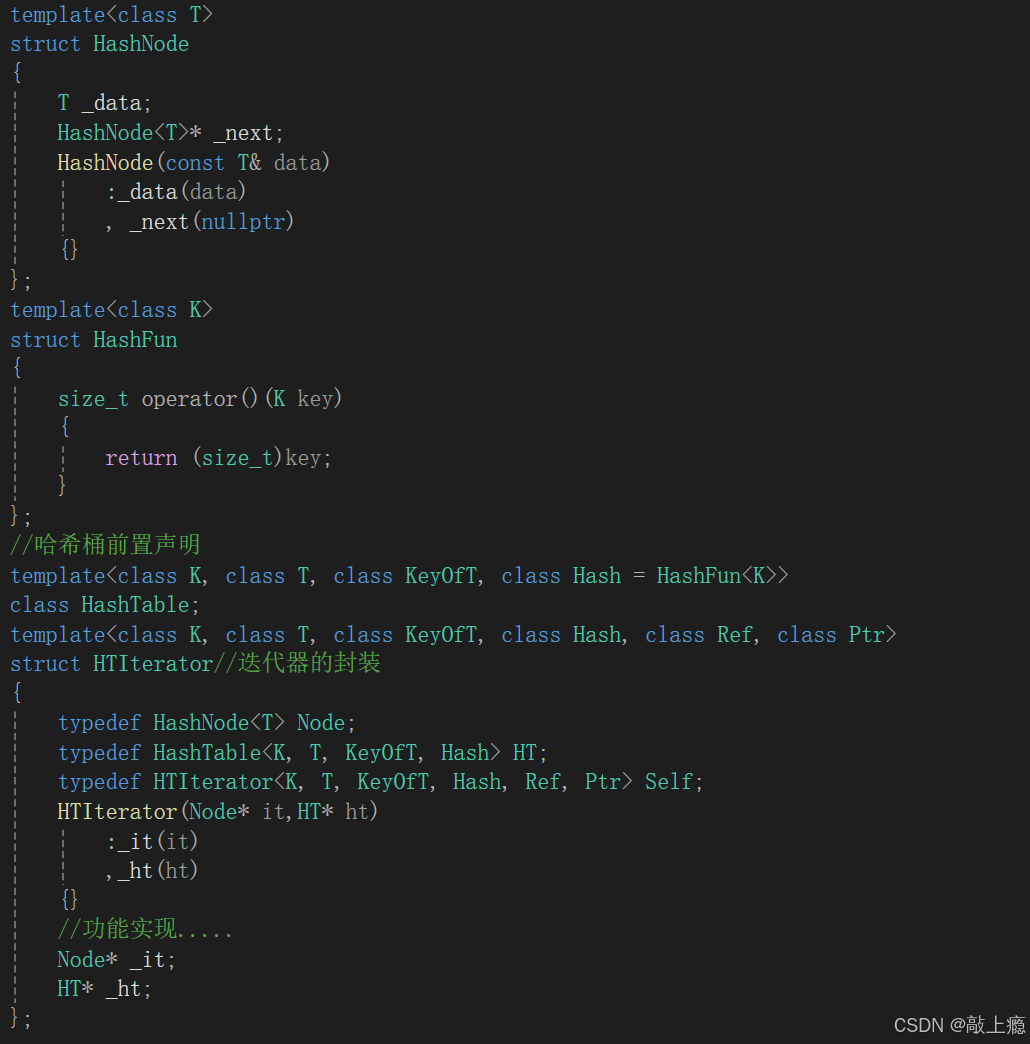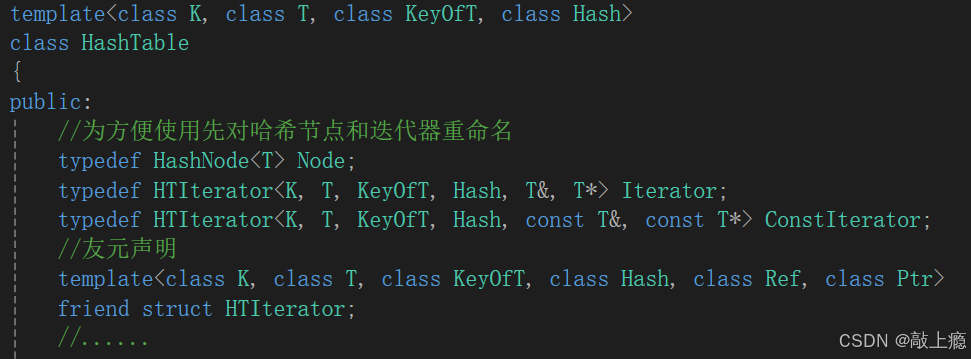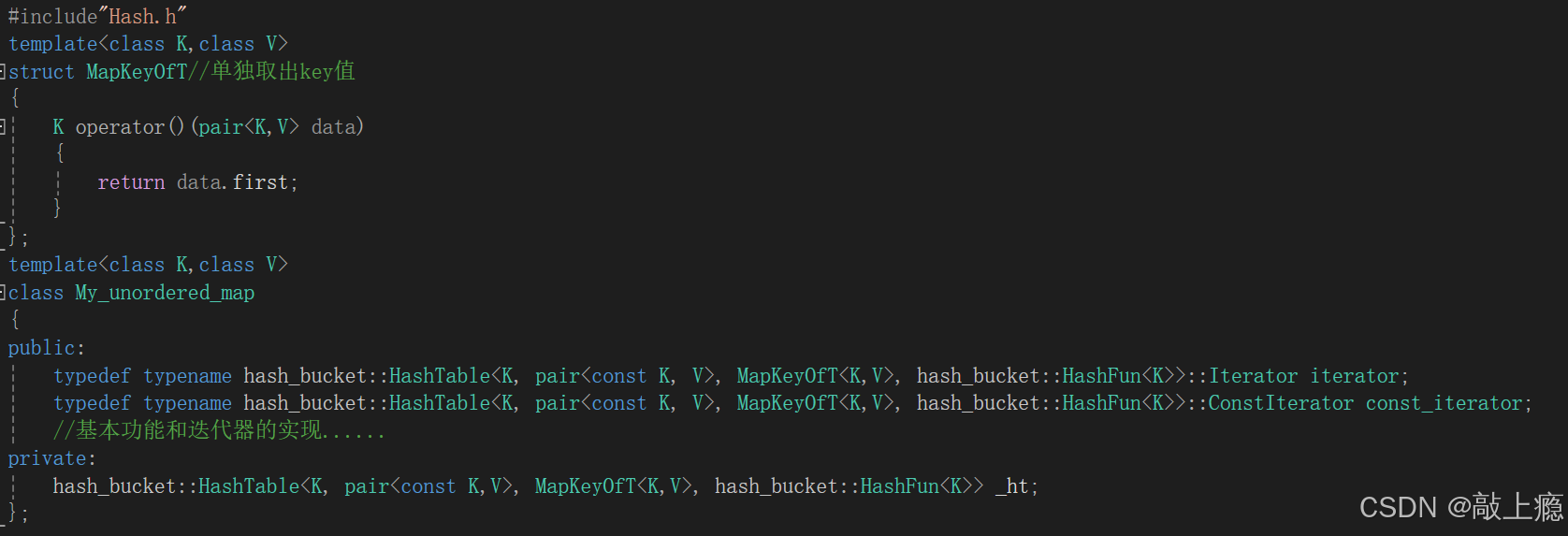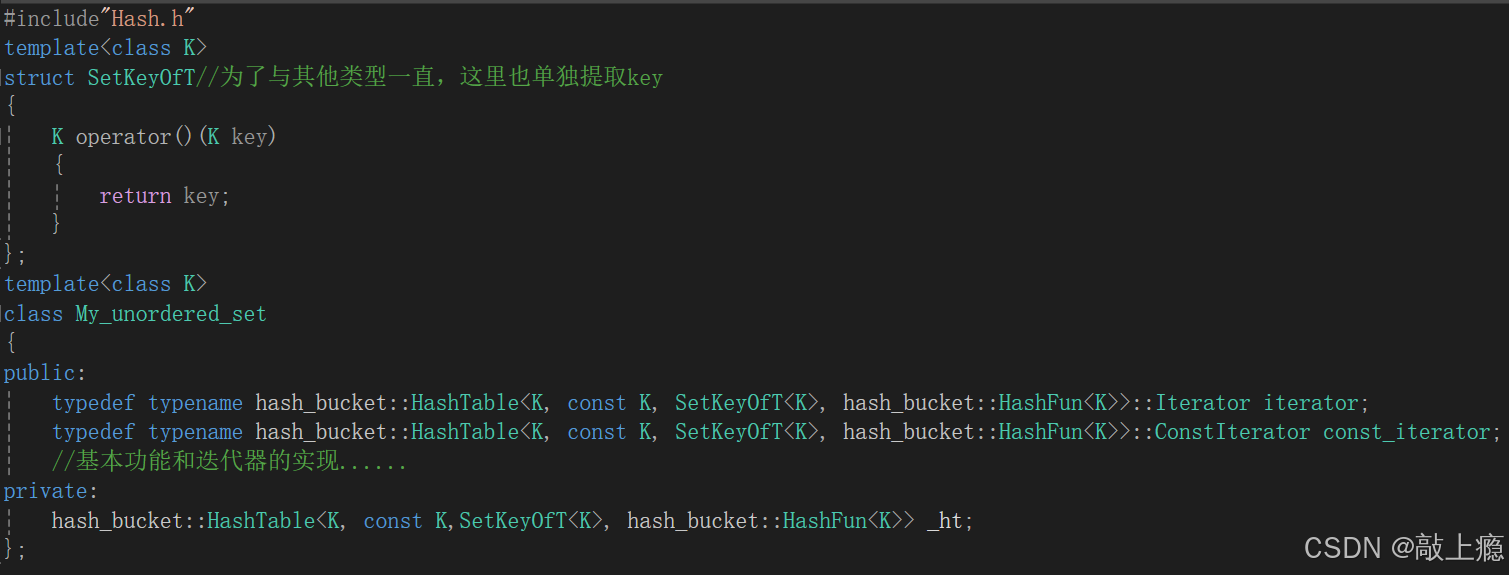个人主页:敲上瘾-CSDN博客
在本章关于哈希表的设计在这里就随便提一点不再过多的讲解,而把重点放在封装部分。
目录
[3. My_unordered_set.h](#3. My_unordered_set.h)
一、哈希表的设计
哈希函数:就是让++数据与储存位置++ 建立一种映射关系,通过这种映射关系就能够快速找到某个数据储存的位置。
哈希冲突:++不同的数据可能会映射到同一块区域++,那么先储存的数据存到了该位置,后储存的数据的位置就被占用了,这两个数据产生哈希冲突。
在哈希表的设计中哈希函数的设计和哈希冲突的处理是非常重要的,它们两个的设计会直接影响到哈希表的效率,++哈希函数的设计有很多的方式,如:除法散列法、乘法散列法、全域散列法。哈希冲突的处理有:开发定址法(包括:线性探测、二次探测、双重散列)、链地址法。++
在本章中选用的是除法散列法和链址法。
说明1:
注1:为方便读者阅读并理解,以下所展示的模板参数部分均已省略
cppstruct HashNode//哈希节点 { T _data; HashNode<T>* _next; //...... }; struct HashFun//哈希函数 struct HTIterator//迭代器 { //...... Node* _it; HT* _ht; }; class HashTable//哈希表 { public: //...... private: vector<Node*> _tables; size_t _n = 0; // 数据个数 };说明2:
1.模板参数的设计
哈希函数用的是除法散列法,也就是对一个数据的key与数组的长度取余,这个余数就是这个数据需要储存的对应下标位置。
要点:++要能取余这个数必须是整数,又因为要把余数作为下标,那么这个余数必须是非负整数。++
因为我们做的是模板要兼容各种内置类型和外置类型,所以有必要设计一个哈希函数,把这数据转换成size_t类型。
又考虑这个数据可能是pair<key,val>类型或其他结构体类型等,所以需要设计一个函数来确定key是谁。
所以在哈希表的设计中作一个这样的模板声明。
- K:传入的数据中key的类型,因为在查找和删除时是依据key来完成的,所以必须单独知道key的类型。
- T: 数据的类型
- KeyOfT:通过仿函数来取到key值
- Hash:通过仿函数把key值转化为size_t类型
为了兼容多种类型,在哈希桶的内部实现中,映射时都需要用KeyOfT和Hash,具体实现请参照下面的源码,就不再做详细讲解。
二、迭代器封装
哈希表的迭代器实现和list的迭代器类似,还是比较复杂的所以我们把它单独封装成一个类模板,那么迭代器的成员变量必然就是哈希节点,但是考虑到当一个哈希节点走到当前哈希桶的空时,无法找到下一个哈希桶的起始位置,所以迭代器的成员变量还需要添加一个哈希表,这个问题就可以解决。
++为了兼容const迭代器,有一个很实用的小技巧,在迭代器模板参数里添加Ref和Ptr,给Ref和Ptr传入T&和T*就能实现普通迭代器,传入const T&和const T*就能实现const迭代器++
所以模板参数如下:

因为迭代器中成员变量存了哈希表所以模板参数必须有K,T,KeyOfT,Hash。考虑需要兼容const迭代器所以增加Ref和Ptr模板参数。
准备工作如下:

1.迭代器简单功能
cpp
Ref operator*()
{
return _it->_data;
}
Ptr operator->()
{
return &_it->_data;
}
bool operator!=(Self it)
{
return it._it != _it;
}2.迭代器++
对于哈希桶结构它实际就是一个链表数组,上文已经提过,为了使迭代器走到一个链表结尾时方便找到另一个链表的开头,所以迭代器模板中引入了一个哈希表的成员。
对于迭代器++我们分两种情况考虑:
- 该迭代器不是链表的尾节点:直接让迭代器移动到该链表的下一个节点即可,
- 该迭代器是链表的尾节点:可以通过哈希映射找到当前迭代器所在的哈希桶,然后从这个哈希桶开始往后找,直到找到头结点不为空的节点为止,该节点即为迭代器++后的结果。
解释:链表的尾节点------next为空的那个节点
代码演示:
cppSelf& operator++() { if (_it->_next) { _it = _it->_next; return *this; } KeyOfT kot; Hash hash; size_t index = hash(kot(_it->_data)) % _ht->_tables.size(); index++; while (index < _ht->_tables.size() && !_ht->_tables[index]) index++; if (index == _ht->_tables.size()) _it = nullptr; else _it = _ht->_tables[index]; return *this; }注意:以上操作访问了哈希表的成员,如果该成员是私有需要在哈希表内把HashIterator做一个友元声明。
三、HashTable内部设计
关于迭代器我们通常都会有普通迭代器和const迭代器,所以有一下设计:

- 迭代器begin:第一个非空的哈希桶的头
- 迭代器end:使用nullptr充当
如下:
cpp
//普通迭代器
Iterator Begin()
{
for (int i = 0; i < _tables.size(); i++)
if (_tables[i] != nullptr) return Iterator(_tables[i], this);
return Iterator(nullptr, this);
}
Iterator End()
{
return Iterator(nullptr, this);
}
//const迭代器
ConstIterator Begin() const
{
for (int i = 0; i < _tables.size(); i++)
if (_tables[i] != nullptr) return Iterator(_tables[i], this);
return Iterator(nullptr, this);
}
ConstIterator End() const
{
return Iterator(nullptr, this);
}四、外层的封装
1.My_unordered_map.h的封装

如上为了后续方便操作,我们再次对迭代器重命名,但要注意加typename表明是成员变量,而不是成员函数。 My_unordered_map的成员变量只要一个哈希表就行。
有了上面的铺垫后My_unordered_map的基本功能和迭代器实现就显得十分简单在这里就不再细讲,我会在文尾分享源码。
注:以上Hash.h中的各种类模板均已放置到 hash_bucket 命名空间中。
2.My_unordered_set.h的封装

关于My_unordered_set的封装逻辑和My_unordered_map是一模一样的就不细讲。
非常感谢您能耐心读完这篇文章。倘若您从中有所收获,还望多多支持呀!
五、源码
1.Hash.h
cpp
#pragma once
#include<iostream>
#include<vector>
#include<string>
using namespace std;
namespace hash_bucket
{
template<class T>
struct HashNode
{
T _data;
HashNode<T>* _next;
HashNode(const T& data)
:_data(data)
, _next(nullptr)
{}
};
template<class K>
struct HashFun
{
size_t operator()(K key)
{
return (size_t)key;
}
};
template<>
struct HashFun<string>
{
size_t operator()(string key)
{
size_t hash = 0;
for (auto val : key) hash += val * 131;
return hash;
}
};
//前置声明
template<class K, class T, class KeyOfT, class Hash = HashFun<K>>
class HashTable;
template<class K, class T, class KeyOfT, class Hash, class Ref, class Ptr>
struct HTIterator
{
typedef HashNode<T> Node;
typedef HashTable<K, T, KeyOfT, Hash> HT;
typedef HTIterator<K, T, KeyOfT, Hash, Ref, Ptr> Self;
HTIterator(Node* it,HT* ht)
:_it(it)
,_ht(ht)
{}
Ref operator*()
{
return _it->_data;
}
Ptr operator->()
{
return &_it->_data;
}
Self& operator++()
{
if (_it->_next)
{
_it = _it->_next;
return *this;
}
KeyOfT kot;
Hash hash;
size_t index = hash(kot(_it->_data)) % _ht->_tables.size();
index++;
while (index < _ht->_tables.size() && !_ht->_tables[index]) index++;
if (index == _ht->_tables.size()) _it = nullptr;
else _it = _ht->_tables[index];
return *this;
}
bool operator!=(Self it)
{
return it._it != _it;
}
Node* _it;
HT* _ht;
};
template<class K, class T, class KeyOfT, class Hash>
class HashTable
{
public:
typedef HashNode<T> Node;
typedef HTIterator<K, T, KeyOfT, Hash, T&, T*> Iterator;
typedef HTIterator<K, T, KeyOfT, Hash, const T&, const T*> ConstIterator;
template<class K, class T, class KeyOfT, class Hash, class Ref, class Ptr>
friend struct HTIterator;
//friend Iterator;错误的友元声明
//friend ConstIterator;
Iterator Begin()
{
for (int i = 0; i < _tables.size(); i++)
{
if (_tables[i] != nullptr) return Iterator(_tables[i], this);
}
return Iterator(nullptr, this);
}
Iterator End()
{
return Iterator(nullptr, this);
}
ConstIterator Begin() const
{
for (int i = 0; i < _tables.size(); i++)
{
if (_tables[i] != nullptr) return Iterator(_tables[i], this);
}
return Iterator(nullptr, this);
}
ConstIterator End() const
{
return Iterator(nullptr, this);
}
HashTable()
{
_tables.resize(11, nullptr);
}
// 哈希桶的销毁
~HashTable()
{
for (int i = 0; i < _tables.size(); i++)
{
Node* cur = _tables[i];
while (cur)
{
Node* next = cur->_next;
delete cur;
cur = next;
}
_tables[i] = nullptr;
}
}
// 插入值为data的元素,如果data存在则不插入
pair<Iterator,bool> Insert(const T& data)
{
Hash hash;
KeyOfT kot;
pair<Iterator,bool> ret = Find(kot(data));
if (ret.second == true)
{
ret.second = false;
return ret;
}
size_t index = hash(kot(data)) % _tables.size();
if (_n == _tables.size())
{
//扩容
vector<Node*> newtable(_tables.size() * 2, nullptr);
for (int i = 0; i < _tables.size(); i++)
{
Node* cur = _tables[i];
while (cur)
{
size_t inx = hash(kot(cur->_data)) % newtable.size();
Node* next = cur->_next;
cur->_next = newtable[inx];
newtable[inx] = cur;
cur = next;
}
_tables[i] = nullptr;
}
_tables.swap(newtable);
}
Node* NewNode = new Node(data);
NewNode->_next = _tables[index];
_tables[index] = NewNode;
return { Iterator(NewNode, this),true };
}
// 在哈希桶中查找值为key的元素,存在返回true否则返回false
pair<Iterator,bool> Find(const K& key)
{
Hash hash;
KeyOfT kot;
size_t index = hash(key) % _tables.size();
Node* cur = _tables[index];
while (cur && kot(cur->_data) != key)
{
cur = cur->_next;
}
if (!cur) return { Iterator(nullptr, this),false };
return { Iterator(cur, this),true };
}
// 哈希桶中删除key的元素,删除成功返回true,否则返回false
bool Erase(const K& key)
{
if (!Find(key)) return false;
Hash hash;
size_t index = hash(key) % _tables.size();
Node* cur = _tables[index], prev = nullptr;
while (cur && kot(cur->_data) != key)
{
prev = cur;
cur = cur->_next;
}
if (prev == nullptr) _tables[index] = prev;
else prev->_next = cur->_next;
delete cur;
return true;
}
private:
vector<Node*> _tables; // 指针数组
size_t _n = 0; // 表中存储数据个数
};
}2.My_unordered_map.h
cpp
#pragma once
#include"Hash.h"
template<class K,class V>
struct MapKeyOfT
{
K operator()(pair<K,V> data)
{
return data.first;
}
};
template<class K,class V>
class My_unordered_map
{
public:
typedef typename hash_bucket::HashTable<K, pair<const K, V>, MapKeyOfT<K,V>, hash_bucket::HashFun<K>>::Iterator iterator;
typedef typename hash_bucket::HashTable<K, pair<const K, V>, MapKeyOfT<K,V>, hash_bucket::HashFun<K>>::ConstIterator const_iterator;
pair<iterator, bool> insert(pair<K, V> kv)
{
return _ht.Insert(kv);
}
pair<iterator, bool> find(K key)
{
return _ht.Find(key);
}
bool erase(K key)
{
return _ht.Erase(key);
}
iterator begin()
{
return _ht.Begin();
}
iterator end()
{
return _ht.End();
}
const_iterator begin() const
{
return _ht.Begin();
}
const_iterator end() const
{
return _ht.End();
}
V& operator[](K key)
{
pair<iterator, bool> ret = _ht.Insert({key, V()});
return ret.first->second;
}
private:
hash_bucket::HashTable<K, pair<const K,V>, MapKeyOfT<K,V>, hash_bucket::HashFun<K>> _ht;
};3. My_unordered_set.h
cpp
#pragma once
#include"Hash.h"
template<class K>//?????
struct SetKeyOfT
{
K operator()(K key)
{
return key;
}
};
template<class K>
class My_unordered_set
{
public:
typedef typename hash_bucket::HashTable<K, const K, SetKeyOfT<K>, hash_bucket::HashFun<K>>::Iterator iterator;
typedef typename hash_bucket::HashTable<K, const K, SetKeyOfT<K>, hash_bucket::HashFun<K>>::ConstIterator const_iterator;
pair<iterator, bool> insert(K kv)
{
return _ht.Insert(kv);
}
pair<iterator, bool> find(K key)
{
return _ht.Find(key);
}
bool erase(K key)
{
return _ht.Erase(key);
}
iterator begin()
{
return _ht.Begin();
}
iterator end()
{
return _ht.End();
}
const_iterator begin() const
{
return _ht.Begin();
}
const_iterator end() const
{
return _ht.End();
}
private:
hash_bucket::HashTable<K, const K,SetKeyOfT<K>, hash_bucket::HashFun<K>> _ht;
};
